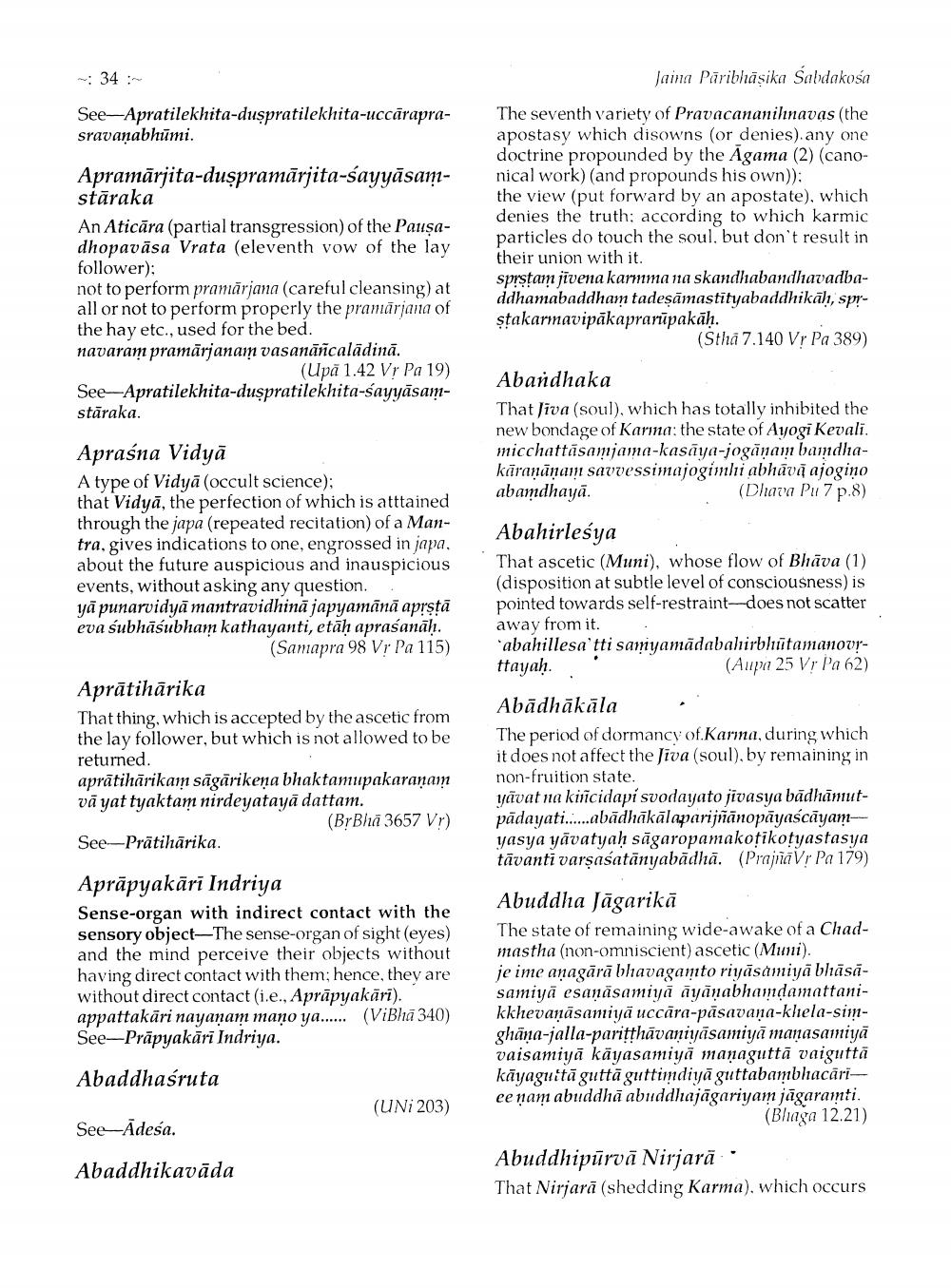________________
~:34:~
See-Apratilekhita-duspratilekhita-uccarapra
sravanabhumi.
Apramarjita-duspramarjita-sayyasam
stāraka
An Aticara (partial transgression) of the Pausadhopavasa Vrata (eleventh vow of the lay follower):
not to perform pramarjana (careful cleansing) at all or not to perform properly the pramarjana of the hay etc., used for the bed.
navaram pramärjanam vasanāñcalădină. (Upă 1.42 Vr Pa 19)
See-Apratilekhita-duspratilekhita-sayyāsam
stāraka.
Apraśna Vidya
A type of Vidya (occult science);
that Vidya, the perfection of which is atttained through the japa (repeated recitation) of a Mantra, gives indications to one, engrossed in japa. about the future auspicious and inauspicious events, without asking any question. ya punarvidya mantravidhina japyamănă apṛṣṭā eva subhāsubham kathayanti, etaḥ aprašanāḥ. (Samapra 98 Vr Pa 115)
Aprätiharika
That thing, which is accepted by the ascetic from the lay follower, but which is not allowed to be returned.
aprātihārikan sägärikena bhaktamupakaranam va yat tyaktam nirdeyataya dattam.
(BrBha 3657 Vr)
See-Pratihārika.
Apräpyakäri Indriya
Sense-organ with indirect contact with the sensory object-The sense-organ of sight (eyes) and the mind perceive their objects without having direct contact with them; hence, they are without direct contact (i.e., Aprāpyakārī). appattakari nayanam mano ya... (ViBht 340) See-Präpyakäri Indriya.
Abaddhaśruta
See-Adesa.
Abaddhikavāda
(UNI 203)
Jaina Paribhasika Sabdakosa
The seventh variety of Pravacananihnavas (the apostasy which disowns (or denies). any one doctrine propounded by the Agama (2) (canonical work) (and propounds his own));
the view (put forward by an apostate), which denies the truth; according to which karmic particles do touch the soul, but don't result in their union with it.
sprstam jivena karmma na skandhabandhavadbaddhamabaddham tadeṣāmastityabaddhikah, sprstakarmavipäkaprarūpakāḥ.
(Stha 7.140 Vr Pa 389)
Abandhaka
That Jiva (soul), which has totally inhibited the new bondage of Karma: the state of Ayogi Kevali. micchattasamjama-kasaya-jogānam bamdhakāraṇāṇaḥ savvessimajogimhi abhāvā ajogiņo abandhaya. (Chava Pu 7 p.8)
Abahirlesya
That ascetic (Muni), whose flow of Bhava (1) (disposition at subtle level of consciousness) is pointed towards self-restraint-does not scatter away from it.
"abahillesatti samyamädabahirbhūtamanovṛttayaḥ. (Aupa 25 Vr Pa 62)
Abädhäkāla
The period of dormancy of Karma, during which it does not affect the Jiva (soul), by remaining in non-fruition state.
yavat na kincidapi svodayato jivasya badhamutpadayati....abädhäkälaparijinopayaścayam
yasya yavatyah sägaropamakotikotyastasya tavanti varṣasatanyabadha. (Prajñā Vṛ Pa 179)
Abuddha Jägarika
The state of remaining wide-awake of a Chadmastha (non-omniscient) ascetic (Muni). je ime anagara bhavaganto riyasamiya bhāṣāsamiya esanasamiya ayāyabhamḍamattanikkhevaṇāsamiya uccara-pasavana-khela-sim
ghana-jalla-pariṭṭhāvaniyāsamiya maṇasamiyā vaisamiya kayasamiya managutta vaigutta käyaguita gutta guttindiya guttabambhacariee nam abuddha abuddhajagariyam jāgaramti. (Bhaga 12.21)
Abuddhipurva Nirjarā That Nirjara (shedding Karma), which occurs.




